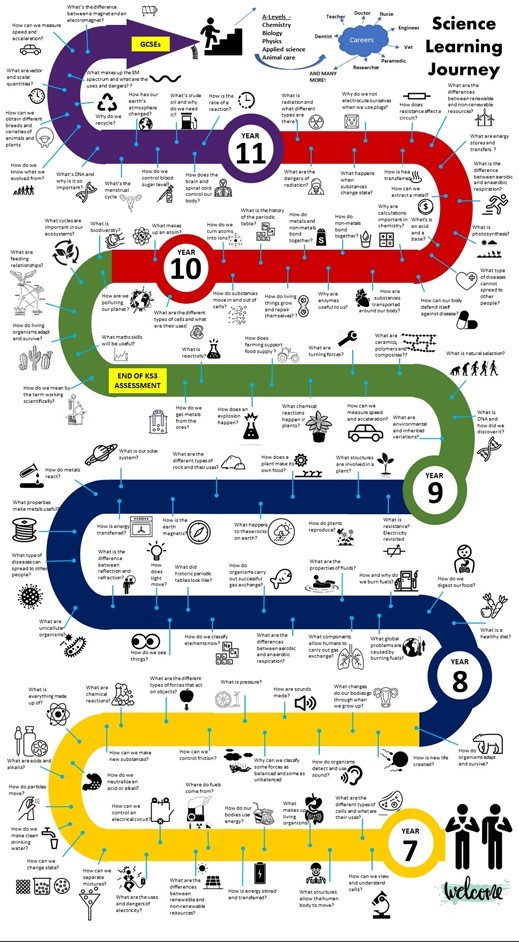Science
Curriculum Intent
Our curriculum is designed to encourage and develop inquisitive learners who are enthusiastic about science. We want them to be safe practical scientists, confident in their abilities but also resilient. Our schemes of work will take them in year 7 and build the core blocks of knowledge covering the big ideas in science culminating in more depth by Year 11 ready for their External GCSE examinations. The assessments are integrated, overarching, progressive and rigorous.
How knowledge and skills build through Key Stage 3
The core knowledge and skills curriculum taught are shaped by the National Curriculum. The aim for this Key Stage is to get students to progress through the KS3 National curriculum and be ready for the step up to GCSE. There is a large volume of content which has been mapped out to ensure students have a good grounding of scientific concepts and disciplinary knowledge, linked to practical work, as well as making sure they have all they need to confidently move through to the GCSEs courses around Easter of Year 9.
How it builds on the Key Stage 2 primary curriculum
Students at Key Stage 2 have a wide range of experiences of science from their feeder primaries. We carry out baseline testing in the Autumn term of Year 7 to try to get a feel for their prior knowledge. An investigative skills unit is also taught in September to help to encourage all students to focus on disciplinary knowledge and introduce all the essential terminology for carrying out practical investigations. The baseline test then gives teachers information on any gaps in subject knowledge at the start of the Key Stage to help them plan and identify interventions as they teach individual units.
Link to Key Stage 4 GCSE curriculum
We use the Exploring Science scheme and resources in KS3 which has been designed to interleave straight into the AQA GCSE specifications. All the units during Year 7, 8 and 9 build up the knowledge getting the students ready to approach their GCSEs with confidence. The GCSE course run, and their specification links are:
- AQA Combined Science: Trilogy
- AQA Triple Sciences
Beyond Kingshill – Post 16 and careers
Studying science is compulsory to 16 as it provides excellent analytical and practical skills that can be used in all aspects of life. GCSE Combined Science gives students the equivalent of two GCSEs and provides a sound background in all the three key areas of science; Biology, Chemistry and Physics. It is also an excellent foundation for those wishing to pursue more vocational science-based courses at college and for vocational onwards careers.
Students studying Triple Science gives them more depth in each discipline and gives them a good basis for going on to study one or more of the sciences separately.
The skills of making predictions, testing hypothesis and drawing conclusions then evaluating the work done are useful for a wide range of careers not just in the scientific areas.
Useful links/resources
- KS3 Science - BBC Bitesize
- GCSE Science - BBC Bitesize
- Free Homework & Revision for A Level, GCSE, KS3 & KS2 (senecalearning.com)
For KS4 :
- fuse school - YouTube,
- The Cognito (youtube.com)
- freesciencelessons | The very best in science education

